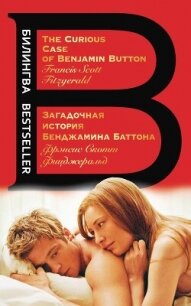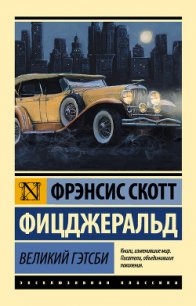Загадочная история Бенджамина Баттона / The Curious Case of Benjamin Button - Фицджеральд Френсис Скотт (книги бесплатно txt, fb2) 📗

Жалоба
Напишите нам, и мы в срочном порядке примем меры.
Загадочная история Бенджамина Баттона / The Curious Case of Benjamin Button - Фицджеральд Френсис Скотт (книги бесплатно txt, fb2) 📗 краткое содержание
Серия представлена бестселлерами на английском языке и мастерскими переводами на русский.
Вы научитесь видеть тончайшую игру слов и стилей, сможете оценить свои возможности как переводчика.
Оригинальный текст и перевод на страницах одной книги.
Эффективный способ усовершенствовать знание английского языка.
Фрэнсису Скотту Фицджеральду принадлежит, пожалуй, одна из ведущих сольных партий в оркестровой партитуре «века джаза». Писатель, ярче и беспристрастней которого вряд ли кто отразил безумную жизнь Америки 20-х годов, и сам был плотью от плоти той легендарной эпохи, его имя не сходило с уст современников и из сводок светских хроник. Его скандальная манера поведения повергала в ужас одних и вызывала восторг у других. Но эксцентричность и внешняя позолота канули в прошлое, и в настоящем остались его бессмертные книги.
В сборнике несколько лучших рассказов и «Загадочная история Бенджамина Баттона», по которой Дэвид Финчер в 2009 году снял одноименный нашумевший фильм с Брэдом Питтом в главной роли.
«Страх старения присущ всем людям. Многие втайне мечтают о вечной молодости. Но юность, проведенная в теле старика – безрадостна».
Загадочная история Бенджамина Баттона / The Curious Case of Benjamin Button читать онлайн бесплатно
Фрэнсис Скотт Фицджеральд
Загадочная история Бенджамина Баттона / The Curious Case of Benjamin Button
© Бабков В., перевод на русский язык, 2023
© Беспалова Л., перевод на русский язык, 2023
© Чарный В., перевод на русский язык, 2023
© Издание на русском языке, оформление. ООО «Издательство «Эксмо», 2023
Francis Scott Key Fitzgerald
The Curious Case of Benjamin Button
(Novels)
The Curious Case of Benjamin Button
I
As long ago as 1860 it was the proper thing to be born at home. At present, so I am told, the high gods of medicine have decreed that the first cries of the young shall be uttered upon the anesthetic air of a hospital, preferably a fashionable one. So young Mr. and Mrs. Roger Button were fifty years ahead of style when they decided, one day in the summer of 1860, that their first baby should be born in a hospital. Whether this anachronism had any bearing upon the astonishing history I am about to set down will never be known.
I shall tell you what occurred, and let you judge for yourself.
The Roger Buttons held an enviable position, both social and financial, in ante-bellum Baltimore. They were related to the This Family and the That Family, which, as every Southerner knew, entitled them to membership in that enormous peerage which largely populated the Confederacy. This was their first experience with the charming old custom of having babies – Mr. Button was naturally nervous. He hoped it would be a boy so that he could be sent to Yale College in Connecticut, at which institution Mr. Button himself had been known for four years by the somewhat obvious nickname of “Cuff.”
On the September morning consecrated to the enormous event he arose nervously at six o’clock, dressed himself, adjusted an impeccable stock, and hurried forth through the streets of Baltimore to the hospital, to determine whether the darkness of the night had borne in new life upon its bosom.
When he was approximately a hundred yards from the Maryland Private Hospital for Ladies and Gentlemen he saw Doctor Keene, the family physician, descending the front steps, rubbing his hands together with a washing movement – as all doctors are required to do by the unwritten ethics of their profession.
Mr. Roger Button, the president of Roger Button amp; Co., Wholesale Hardware, began to run toward Doctor Keene with much less dignity than was expected from a Southern gentleman of that picturesque period.
“Doctor Keene!” he called. “Oh, Doctor Keene!”
The doctor heard him, faced around, and stood waiting, a curious expression settling on his harsh, medicinal face as Mr. Button drew near.
“What happened?” demanded Mr. Button, as he came up in a gasping rush. “What was it? How is she? A boy? Who is it? What-”
“Talk sense!” said Doctor Keene sharply. He appeared somewhat irritated.
“Is the child born?” begged Mr. Button.
Doctor Keene frowned.
“Why, yes, I suppose so – after a fashion.” Again he threw a curious glance at Mr. Button.
“Is my wife all right?”
“Yes.”
“Is it a boy or a girl?”
“Here now!” cried Doctor Keene in a perfect passion of irritation. “I’ll ask you to go and see for yourself. Outrageous!”
He snapped the last word out in almost one syllable, then he turned away muttering:
“Do you imagine a case like this will help my professional reputation? One more would ruin me – ruin anybody.”
“What’s the matter?” demanded Mr. Button appalled. “Triplets?”
“No, not triplets!” answered the doctor cuttingly. “What’s more, you can go and see for yourself. And get another doctor. I brought you into the world, young man, and I’ve been physician to your family for forty years, but I’m through with you! I don’t want to see you or any of your relatives ever again! Good-by!”
Then he turned sharply, and without another word climbed into his phaeton, which was waiting at the curbstone, and drove severely away.
Mr. Button stood there upon the sidewalk, stupefied and trembling from head to foot. What horrible mishap had occurred? He had suddenly lost all desire to go into the Maryland Private Hospital for Ladies and Gentlemen – it was with the greatest difficulty that, a moment later, he forced himself to mount the steps and enter the front door.
A nurse was sitting behind a desk in the opaque gloom of the hall. Swallowing his shame, Mr. Button approached her.
“Good-morning,” she remarked, looking up at him pleasantly.
“Good-morning. I–I am Mr. Button.”
At this a look of utter terror spread itself over the girl’s face. She rose to her feet and seemed about to fly from the hall, restraining herself only with the most apparent difficulty.
“I want to see my child,” said Mr. Button.
The nurse gave a little scream.
“Oh – of course!” she cried hysterically. “Up-stairs. Right upstairs. Go – up!”
She pointed the direction, and Mr. Button, bathed in a cool perspiration, turned falteringly, and began to mount to the second floor. In the upper hall he addressed another nurse who approached him, basin in hand.
“I’m Mr. Button,” he managed to articulate. “I want to see my-”
Clank! The basin clattered to the floor and rolled in the direction of the stairs. Clank! Clank! It began a methodical descent as if sharing in the general terror which this gentleman provoked.
“I want to see my child!” Mr. Button almost shrieked. He was on the verge of collapse.
Clank! The basin had reached the first floor. The nurse regained control of herself, and threw Mr. Button a look of hearty contempt.
“All right, Mr. Button,” she agreed in a hushed voice. “Very well! But if you knew what a state it’s put us all in this morning! It’s perfectly outrageous! The hospital will never have the ghost of a reputation after-”
“Hurry!” he cried hoarsely. “I can’t stand this!”
“Come this way, then, Mr. Button.”
He dragged himself after her. At the end of a long hall they reached a room from which proceeded a variety of howls – indeed, a room which, in later parlance, would have been known as the “crying-room.”
They entered. Ranged around the walls were half a dozen white-enameled rolling cribs, each with a tag tied at the head.
“Well,” gasped Mr. Button, “which is mine?”
“There!” said the nurse.
Mr. Button’s eyes followed her pointing finger, and this is what he saw. Wrapped in a voluminous white blanket, and partly crammed into one of the cribs, there sat an old man apparently about seventy years of age. His sparse hair was almost white, and from his chin dripped a long smoke-coloured beard, which waved absurdly back and forth, fanned by the breeze coming in at the window. He looked up at Mr. Button with dim, faded eyes in which lurked a puzzled question.
“Am I mad?” thundered Mr. Button, his terror resolving into rage. “Is this some ghastly hospital joke?
“It doesn’t seem like a joke to us,” replied the nurse severely. “And I don’t know whether you’re mad or not – but that is most certainly your child.”
The cool perspiration redoubled on Mr. Button’s forehead. He closed his eyes, and then, opening them, looked again. There was no mistake – he was gazing at a man of threescore and ten – a baby of threescore and ten, a baby whose feet hung over the sides of the crib in which it was reposing.




